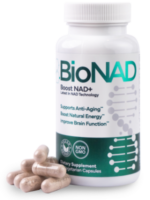Lifestyle Tips For NAD+ Boost: Embrace Healthy Aging

Published November 27, 2024
Are you seeking the key to better health and longer life? Understanding NAD+ (nicotinamide adenine dinucleotide) might just be the answer. This vital coenzyme is essential in energy production and cellular repair. However, our NAD+ levels decline as we age, potentially affecting our health and vitality. Maintaining optimal NAD+ levels could transform your well-being and energy levels.
In this article, we’ll explore what NAD+ is, its crucial role in cellular health and aging, and lifestyle tips for NAD+ boost.
What Is NAD+?
NAD+ is a coenzyme found in every cell in the body. It’s vital in many biological processes, including energy metabolism and DNA repair. NAD+ also participates in redox reactions, transferring electrons between molecules to aid energy production.
NAD+ is crucial for regulating sirtuins. These proteins influence cellular processes like stress response, gene expression, and longevity. Keeping NAD+ levels balanced is vital for maintaining cellular function and promoting health.

The Key Role Of NAD+ In Cellular Health And Aging
NAD+ is vital for cellular health and has emerged as a crucial component in aging research. As we age, NAD+ levels naturally decrease. This reduction hampers DNA repair and cellular metabolism.
As NAD+ levels decline, cellular function deteriorates. This increases the body’s vulnerability to age-related diseases. Ailments such as metabolic disorders, neurodegenerative diseases, and cardiovascular ailments are affected. Enhancing NAD+ levels could slow aging. It may also mitigate the decline in cellular function associated with aging.
Lifestyle Tips For NAD+ Boost
To counter the natural decline in NAD+ levels, adopting specific lifestyle habits can be beneficial.
Physical Activity
Regular exercise is one of the most effective ways to boost NAD+ levels. Physical activity increases the demand for NAD+ in energy production, prompting the body to produce more. Aerobic and resistance training can enhance NAD+ availability and improve overall metabolism. Trying to stay physically fit can go a long way in slowing down the progression of the aging process.
Limit Sun Exposure
Excessive sun exposure can deplete NAD+, which the body uses to repair skin damage caused by UV rays. Protect the skin with appropriate clothing. Choose lightweight and loose-fitting options. Limit direct sunlight exposure when outdoors, if possible. These actions can help preserve NAD+ levels.
Look For Sources Of Heat
Spending time in saunas, heated pools, or hot tubs can stimulate NAD+ production. The heat increases heart rate and energy demand, encouraging the body to boost NAD+ levels to maintain energy balance.
Dietary Changes
Eating foods rich in vitamin B3 can boost NAD+ synthesis. Try avocados, steamed fish, and peanuts for these nutrients. If you no longer drink milk, it might be the right time to start drinking two to three glasses of cow’s milk daily.
While you add new foods to your diet, you should also limit the amount of certain foods, such as rice, bread, and other white flour products. A healthier option is using less-processed whole grains with higher B vitamins.
Fermented foods and beverages, such as kimchi, sauerkraut and kombucha, naturally contain NAD+. They can help support its levels. Additionally, these foods help ease bloating and chronic joint pain.
Fasting And Ketosis Diets
Intermittent fasting and ketosis diets trigger metabolic changes that can enhance NAD+ levels. Intermittent fasting involves periods of eating and cycles of fasting. Popular plans often follow a 16—to 24-hour fasting twice weekly, followed by healthy meals. This eating pattern triggers body shock, boosting the natural supply of NAD+.
A ketosis diet involves adhering to a low-carb, high-protein, healthy fats food regimen. This diet can help reduce significant weight and boost the body’s natural levels of NAD+.
Frequently Asked Questions
How does the circadian rhythm affect NAD+ levels?
The circadian rhythm serves as the internal clock of the body that regulates sleep and wake cycles. It plays a significant role in maintaining NAD+ levels. Consistent sleep patterns are essential to preserving NAD+ balance, vital for optimal cellular function and energy metabolism.
Can stress influence NAD+ levels?
Yes, chronic stress can deplete NAD+ resources. This compromises cellular function and increases susceptibility to age-related diseases. Managing stress through relaxation techniques and consistent exercise can help preserve NAD+ levels.
What happens when NAD+ levels are low?
When NAD+ levels drop, they can compromise DNA repair, weaken the cellular stress response, and disrupt energy metabolism. These effects may cause metabolic disorders such as obesity and insulin resistance and increase the likelihood of age-related diseases.

Empower Your Health: Unlock The Benefits Of NAD+ Today
Understanding the pivotal role of NAD+ in cellular health and aging highlights the importance of maintaining its levels through lifestyle adjustments. By incorporating these modifications into your routine, you can support the body’s NAD+ production. Embracing these lifestyle tips for NAD+ boost promotes longevity and overall well-being, leading to a healthier, more energetic life.

Try BioNAD Now & Experience The Boost!
NAD+ (Nicotinamide Adenine Dinucleotide) is a crucial coenzyme found in every cell of your body, playing a vital role in cellular energy production and metabolism. BioNAD supplements aim to elevate your NAD+ levels, providing numerous health benefits.

About The Author
Meet Corinne Grace, a nurse with a passion for writing. Her expertise lies in health and wellness topics, where she blends academic knowledge with engaging story telling.

This Content Has Been Reviewed For Factual Accuracy
This content has undergone thorough fact-checking by our team of experts. Learn more about the editorial standard for our website here.




